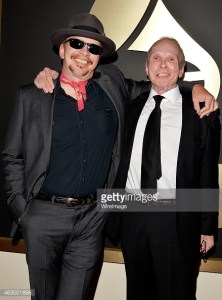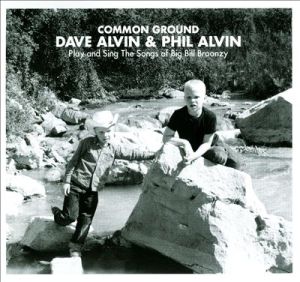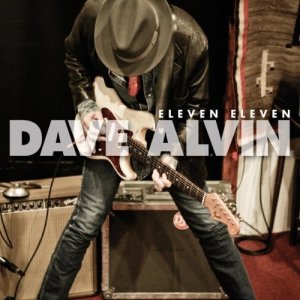Dave & Phil Alvin: Blues Brothers (Interview)
With The Blasters, brothers Dave and Phil Alvin formed one of the most exciting bands to emerge out of the LA punk scene of the early 1980s. The two have since gone their separate ways but recently got together to record Common Ground, a tribute album to blues great Big Bill Broonzy. Following the success of that album, Dave and Phil will perform in New Zealand for the first time at Bodega in Wellington on Wednesday, April 1st and Auckland’s Tuning Fork on Thursday, April 2nd. The 13th Floor’s Marty Duda spoke to Dave Alvin just after he and Phil attended the recent Grammy Awards ceremony. Dave reveals his feelings about the awards show and why Bill Big Broonzy became such a huge influence on him and his brother.
Click here to listen to the interview with Dave Alvin:
Or, read a transcription of the interview here:
MD: This being the first time you guys have been here, does it affect what the set list is and how you approach the show or are you doing …?
DA: No not really. The show that we’re doing is about 2/3 of the new album and the rest is made up of songs from my solo albums and songs from, like we do 3 I guess, 3 or 4 maybe, Blasters songs depending on the mood.
MD: Gotcha, and is it just the two of you or do you have a band with you? How is it working?
DA: Oh yeah, I have my band with us.
MD: Excellent.
DA: Bass, Drums and Guitar. Yeah it’s pretty rocking.
MD: Excellent. Well I know that you attended The Grammys, was it last week and I was hoping that you were going to be able to tell me some stories about that because it’s The Grammys and it’s a ridiculous, the whole thing. I watched… it went on for like 3 and a half hours on T.V and stuff.

DA: Yeah, I don’t have any stories. I went, I won a Grammy like 12 years ago or so.
MD: Right.
DA: And I enjoyed it. It was kind of fun but it’s very different now because categories like Blues and that sort of thing are all in the pre-show which in the old days was pretty cut and dry, they did it in the hours leading up to the TV show and then, like I said it was pretty cut and dry.
MD: Yeah.
DA: So and so for so and so and the winner is so and so.
MD: Right.
DA: Now they have…even the pre-show now they got shows going on, they got a live band and they got singers singing…
MD: So it’s a big production ?
DA: Yeah. So it’s not really my deal but on the other hand it’s nice to get recognised, it really is because guys like us, we don’t get recognised that often. I always put it in the…I use the analogy its like Pop music is downtown and we’re way out on the outskirts.
MD: Absolutely.
DA: So it’s nice very now and then to know that somebody downtown is listening and that you’re not working entirely in a vacuum?
MD: Yeah you’re watching it and it looks like an entirely different world, the kind of thing that you guys are doing.
DA: Yeah It is. I mean it’s almost, I mean there’s a point where show business and all that take over and that’s kind of at the point… my main complaint with a lot of modern Pop music is it’s all choreographed and I tend to like, my taste in music, tends to run to the don’t know what’s going to happen.
MD: Yeah exactly.
DA: There are points in our show, there are sections that I have been doing for years. There’s always a section of the show where we don’t know what’s going to happen.
MD: Right.
DA: And whether that involves jam sessions or this that and the other, it just boils down to, I like that. If you go see Bob Dylan there’s a chance he’s going to do something that you’re not expecting.
MD: Exactly.
DA: And I like that. In Blues music so much of it is depending on the emotional intensity of the performance that’s happening right in front of your eyes in Blues or Gospel or even Country, old style Country music.
MD: Yeah.
DA: And modern music, modern Pop music whether it’s from Nashville or Hollywood or New York, it’s basically all about choreography.
MD: Yup.
DA: And that just bores me. It’s like well that’s great, you’re all dancing, that’s wonderful. So yeah, I don’t have any, it’s not part of my world.
MD: So you and Phil haven’t worked out any dance moves between the two of you.
DA: Oh I’ll…don’t go crazy, yeah of course we have!!
 MD: Fantastic. I was hoping just to talk to you a little bit about the Common Ground record and Big Bill Broonzy because I’m sure there are folks who are familiar with Big Bill and then they’re people who are not. I mean, these musicians like Big Bill and all these other older Blues guys, they were around a long time ago and a lot of their names to a lot of people kind of blend into each other. So I was hoping you could just kind of give me an overview of why you chose to highlight his music and what his music means to you.
MD: Fantastic. I was hoping just to talk to you a little bit about the Common Ground record and Big Bill Broonzy because I’m sure there are folks who are familiar with Big Bill and then they’re people who are not. I mean, these musicians like Big Bill and all these other older Blues guys, they were around a long time ago and a lot of their names to a lot of people kind of blend into each other. So I was hoping you could just kind of give me an overview of why you chose to highlight his music and what his music means to you.
DA: Well he always was an influence on us. He was one of our earlier influences as far as Blues goes. He was the first guy we heard, a pre-war blues music, pre-World War 2.
MD: Yeah.
DA: He was a strong personality that came through the records and he was a powerful singer, he was a great guitar player and he was a solid damn songwriter and he had a 30 year long career starting from the late 20s to the late 50s.
MD: Right.
DA: And in the Blues world that’s pretty amazing.
MD: Yeah.
DA: And especially in those eras, the turnover rate was quite quick and he managed to survive. Yeah, his music was always sort of a link for us. One of the big things was for me as a songwriter, his song writing developed the older he got. It got better and better. That always was an influence on me and then, but the main thing I think is, he had a sound between his voice and his guitar but at the same time over those 30 years, he recorded, wrote and played at a variety of Blues and Blues related styles, but he always managed to sound like himself. He never sounded not like himself, but he also, kind of going back to what I was just saying, you kind of never knew what you expected when you got a Big Bill record.
MD: Right.
DA: Some Blues artists, you know what to expect. Big Bill, it could have been him, just him with a guitar, it could have been him with saxophones or pianos or harmonicas or electric instruments, you just never knew. He’s a good guy into the eclectic side of Blues.
Listen to Big Bill Broonzy’s recording of Key To The Highway here:
MD: Yeah. So would you say that you kind of base your career on things that you’ve learned from Big Bill? I mean you’ve gone through several changes over the years but you still have this kind of consistent sound to yourself.
DA: Yeah that’s kind of the goal, yes. Certainly that’s the Big Bill role.
MD: What would Big Bill do?
DA: Kinda, yeah. I mean there’s artists like that, more famous artists like that, Bob Dylan or Sam Cooke or somebody like that, even Ray Charles.
MD: Right.
DA: Or even George Jones or something like that, throughout their career they grew and they matured and they did different things but they always sounded like them. So that was sort of the rule for me.
MD: What is it about that music that appeals to you? because I know you used to have Lee Allen play with you in The Blasters and you had a song about Johnny Ace. Obviously that holds a certain something for you.
DA: Well I like a lot of that music because a lot of different reasons. A lot of that music whether it’s Blues or Old Jazz or old Country music, whatever, it’s sonic history, meaning its more than just the history of the music, it’s the history of the country and it’s the history of the culture, especially told from a working class perspective.
MD: Yeah.
DA: So that always attracted me and then certain things with the grooves, people are attracted to certain grooves for whatever reason in their DNA. It’s a complicated question, it’s not easy.
MD: Sorry about that.
DA: You’re making me work.
MD: Oh man, I feel bad now.
DA: Well yeah I mean, there’s a lot of…tonality plays into it, technical chops play into it, you hear some people go how the hell did he do that.
MD: Right.
DA: Especially how the hell did he do that 80 years ago without the gift of overdubbing, all that kind of stuff? I think in a lot of chronicled Folk music there’s an emotional honesty and intensity that its really all in all kind of what attracts me. You don’t get that from, the same sort of thing from Taylor Swift or whoever else has got top of the Pops these days.
MD: Katy Perry.
DA: There’s songs that come out of Nashville, I was cracking up at The Grammys actually, they would have things like, whatever, best such and such song and there would be like, some of these songs have like seven people writing on it.
MD: Oh yeah.
DA: I’m like really, it took 7 of you to write that? Really, wow. So I think that people tend to think that modern artists have all this vision and control and everything but there’s so much calculation that goes into modern Pop music that just didn’t go into old Blues records… ‘go in there record what you got and get out’. So anyway, all that plays a part in why I like that kind of music.
 MD: Cool and it’s been a few years since you’ve had your own solo album since Eleven Eleven came out, that was what in 2011. Are you in the process of doing anything along those lines as well?
MD: Cool and it’s been a few years since you’ve had your own solo album since Eleven Eleven came out, that was what in 2011. Are you in the process of doing anything along those lines as well?
DA: Oh we’ll see.
MD: Alright. So there are songs in progress and stuff happening?
DA: Well there’s always something going on in my brain, yeah. But it’s not… I may make another record with my brother, this is pretty fun.
MD: Oh that’s good to hear.
DA: We’ll see what happens, yeah.
MD: Are you surprised that the two of you managed to hold this together for so long?
DA: Well if you would have told me 10 years ago that I’d be doing this I would have told you, you were crazy. Everybody changed and matured and I think that my brother and I both have more respect for each other now than we used to have back 30 years ago when we were in The Blasters and we were young brothers duking it out.
MD: Yeah.
DA: Now we’re older brothers that kind of respect each other. There’s not that kind of jockying for a position, we’ve each defined our position and that kind of works well together.
MD: Yeah. There’s always that brother thing going on in music. I think we’re still waiting for the Davies brothers to get along together.
DA: Yeah, that may not happen.
MD: So what is the status of The Blasters? Are they an ongoing concern as well?
DA: Yeah. Phil’s got a band called The Blasters, it’s got him and two of the other original guys.
MD: Right.
DA: And a real good guitar player.
MD: Right.
DA: Yeah, it’s a different thing than what I do.
MD: Right.
DA: There’s certain elements of that in what I do. The reason I didn’t use the guys from the band, with the exception of the piano player, Gene Taylor, was if I were to use The Blasters then it would have been The Blasters play Big Bill Broonzy, I wanted it to be the Alvin brothers.
Click here for more information about the Alvin Brothers’ show at The Tuning Fork.
Click here for information about their show at Bodega in Wellington.
- Challengers – Dir: Luca Guadagnino (Film Review) - April 24, 2024
- Civil War – Dir: Alex Garland (Film Review) - April 9, 2024
- Pearl Jam – Dark Matter (Monkeywrench/Republic) Album Review - April 1, 2024
